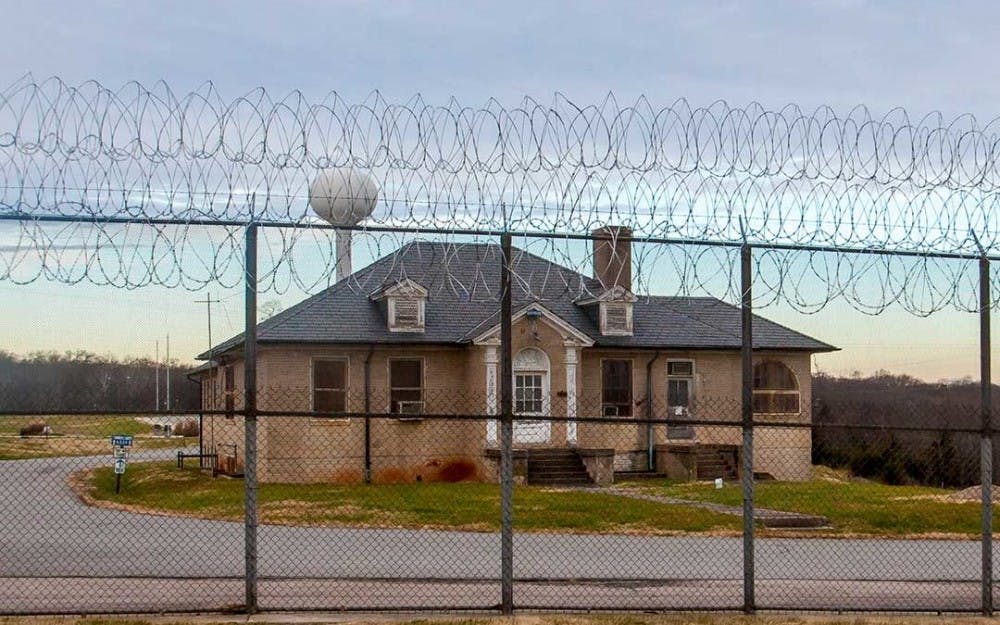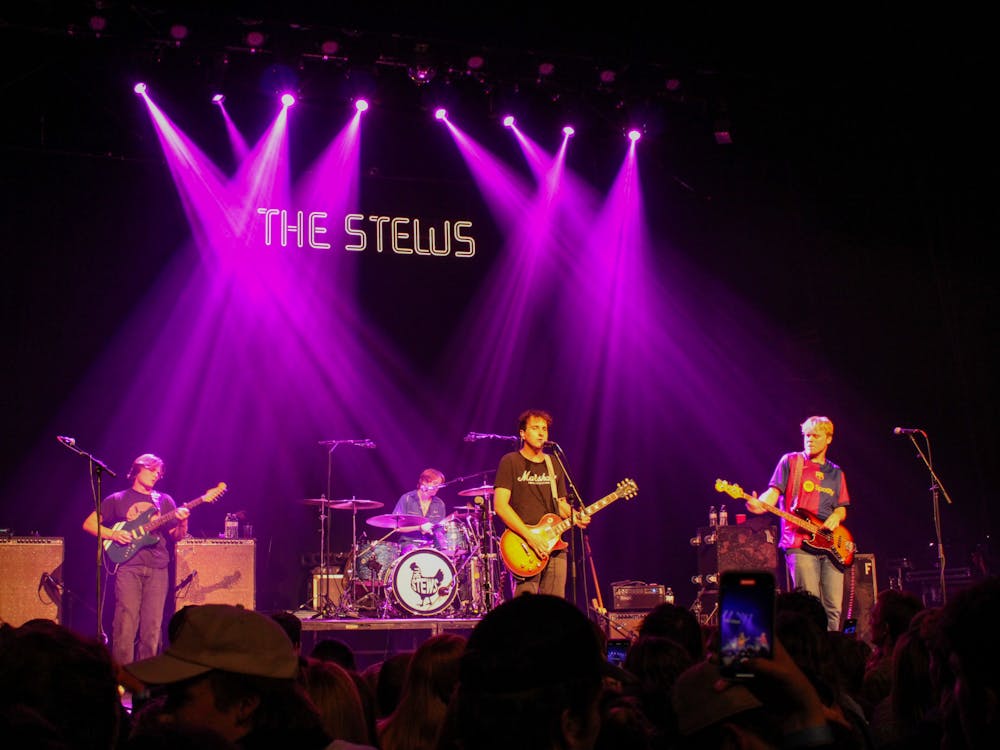University alumnus and director Chris Farina has reached critical acclaim with his documentary films for decades. From the exploring the roadside residents of Pulaski Highway in “Route 40” — his first film made with Reid Oechslin — to diving into the Charlottesville community in “West Main Street” (also made with Oechslin), Farina has captured in film the everyday lives of everyday people in the communities that matter to him. Another of his projects, “World Peace and other 4th-Grade Achievements,” showcased the life-changing work of Charlottesville teacher John Hunter, who invented the now widespread World Peace Game to teach elementary schoolers about global relations.
Farina’s most recent undertaking is the film “Seats at the Table,” a portrait of University Lecturer Andrew Kaufman’s class “Books Behind Bars” in which students venture into a juvenile detention facility and study Russian literature alongside the residents. Both “Seats at the Table” and “West Main Street” are being shown at the Virginia Film Festival this year, and Arts and Entertainment had the opportunity to chat over the phone with Chris Farina about his goals, his films and his identity as a filmmaker.
This interview has been condensed and edited for clarity.
Arts and Entertainment: When you studied here at U.Va., you studied American Government. How did you get into filmmaking?
Chris Farina: Well, it started actually in class. There was this teacher I had three different times and it was more of like, film criticism. And so the last one, the last class was a seminar, and instead of writing a paper, I came up with the idea of doing a documentary film. I wrote a treatment, and described it, and then filmed one scene. And then when I graduated — and I mean it took years because of the money and everything — but that was the really the start of my first film.
AE: How do you choose what subject matter your films will be about?
CF: In some ways, they almost find me, like the one about life along this highway in Baltimore where I grew up. And I just had the idea, I literally was back for Christmas break and was sitting in this working class bar in the neighborhood I grew up in. I saw this scene in front of me that I thought would be the great ending of a film to kind of sum up this area, and that’s what led to the making of this first film, literally just being there.
And then, the second one which is in the film festival too, that was called “West Main Street.” In some ways, that really started kind of as I moved back to Charlottesville from Baltimore, and that was more of an exploration of a place that I was becoming more familiar with. I’ve always been interested in people who don’t get much attention, and even in “West Main Street,” it’s like looking for beauty in places that you don’t expect to find it.
AE: Kind of going off of that discussion, how has Charlottesville served as a backdrop for your filmmaking and for some of the content that your films cover?
CF: In many ways, the thing I’ve always been drawn to has been on the micro level. In many ways, we’re looking for the universal experience, what you can find in those communities that can really be found in other communities. Instead of doing a film about Route 40, which goes from Atlantic City to Salt Lake City, I chose a five mile stretch of road. And in the same way, you could say that about “World Peace” and the “Books Behind Bars,” it wasn’t some macro look at innovative education, it was just a portrait of a class, giving people that sense of what transformative education could be. And because of being local myself, and having a business, and having kids that were in like middle school and high school, it kind of makes sense for me to be looking in my community to make things work.
AE: So, it’s about going into the community to learn more about it as a part of it.
CF: Yeah. And my work kind of generally comes out of affection for the subjects. So there’s that sense of knowing the people, knowing the location and the place and trying to almost share that sense of love with the audience. You know, so I’ve never been a journalistic filmmaker that’s looking for the dirt — not that there’s anything wrong with that, it’s just not my style. It’s been more about finding things that do really inspire me and saying, “Hey, this is something that others should know about.”
AE: The press release for “Seats at the Table” describes the film as one that explores the relationship between education and transformation. What does that mean to you? How do you define that relationship?
CF: So I’ve been a real admirer of innovative educators because of the effect they have on the next generation, and literally the students that they touch. And so for me, seeing “Seats at the Table,” I was so moved by really the authentic relationships that were in that classroom, between the residents — which is what they call the kids that are incarcerated — and the U.Va. students. And it was really genuine, and it was emotionally moving to me … and so for me, it’s just a question of getting to know those individuals, because again, I don’t talk to an expert about it, I just follow the process. It’s more of a portrait of the class, trying to get to know them enough to really understand the impact the class has on their lives.
AE: It must have been really interesting to observe the mutual learning between the residents and the students.
CF: And that really comes from the wisdom and the framework of Andrew Kaufman, of what he’s creating. It’s really brilliant in that it’s not a top-down kind of educational model. And people often think, “Oh the U.Va. students are going in, they must be going in there to teach the kids.” And I mean, there’s a few literature majors in there but you’ve also got physics, Comm school, engineering, education, a lot of different fields. Once those kids got to know each other, it was very much a shared experience, each of them coming together to talk about the story but also their lives. And in ways, both groups have their sort of classic stereotypes going in and those stereotypes are completely dismantled. I don’t mean to summarize it in a simple way, but U.Va. students are kind of impressed at the smarts they may not have expected from the residents, and the guys incarcerated are really impressed with the empathy and the compassion, as opposed to being labelled for their crime, so it really does give that sort of mutual [benefit], each is affecting the other in pretty powerful ways.
AE: In a dreamscape, ideal world, what do you want people to take away from this movie?
CF: On one level, it’s — and this has always been my goal — to move people emotionally, to defy what their expectations are and make them realize that the world is a much more complicated than people often think. It’s to get rid of the labels, and the statistics, and get these people involved as more than students, as individuals. And if you can touch people’s hearts by understanding the individuals, then you can move forward and say, “Okay, how do we change lives?” And what I’m hoping for its bigger effect is how do use this example both to inspire other educators as well as people with power to realize that education is such a key to bring more of these opportunities. So the hope is that people are inspired by it, and then the experts, the people involved in creating policy, will see that this is something we should do in our own community.
AE: Speaking of change, “West Main Street” was finished in 1995, two decades before what happened in Charlottesville in August 2017. What kind of resonance do you think “West Main Street” will still hold today when its being shown in the film festival?
CF: My hope is that people really value the everyday people that do such good work in this community. And in a lot of ways I feel like there’s so much noise going on right now that I almost feel like people have a little bit less of a sense of listening. And that [post August 11th and 12th] was tough, I mean I feel like the town is still reeling. And that’s the reason I kind of had it digitized. I felt like the town needed it, you know, let’s pull back a little bit and look at the goodness that exists in Charlottesville, and the goodness is the people. And I feel like we’ve forgotten that a little bit.
AE: What are the biggest challenges to making a documentary, especially as you’ve described how you really commit to the emotions behind it?
CF: In general, my films are pretty quiet and I think it’s sometimes a little bit harder to generate attention because there’s so much out there now, so many films are being submitted to film festivals, and to have something that’s kind of slow, kind of quiet, it takes a lot more day to day work to try to get it out. But on the other hand, film does have a purpose that’s not just about fame and fortune. It’s about asking, “Can the film be used as a tool so more people can benefit from the experience?” And if the film forwards that kind of mission with wider replication, then that’s a success.





